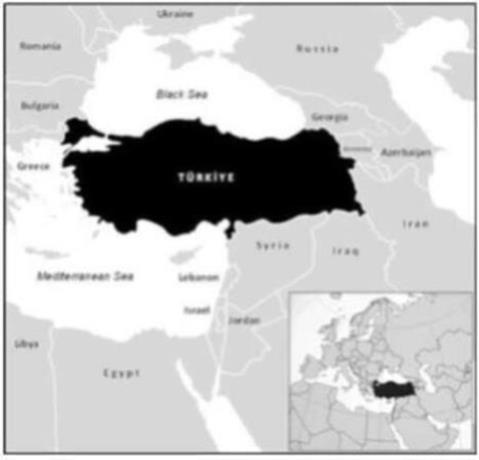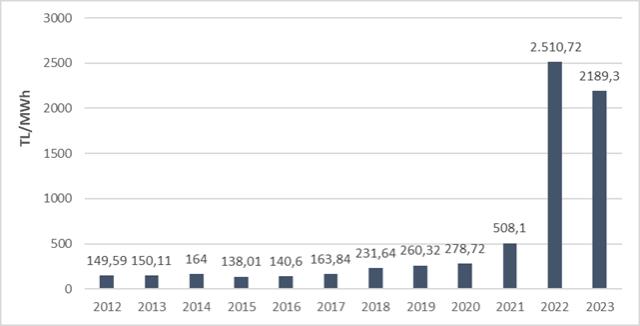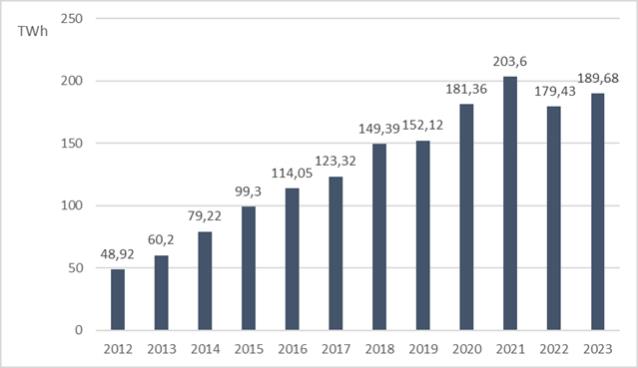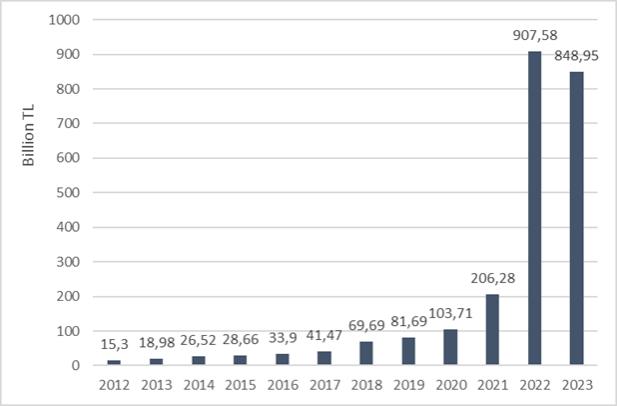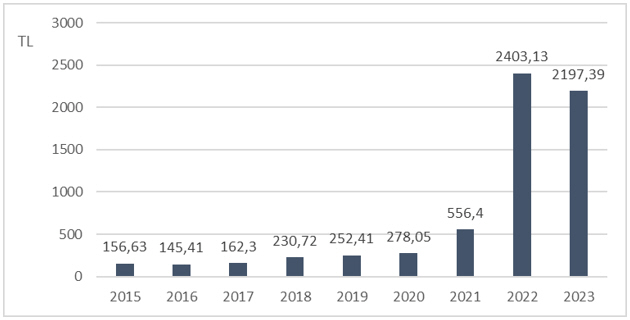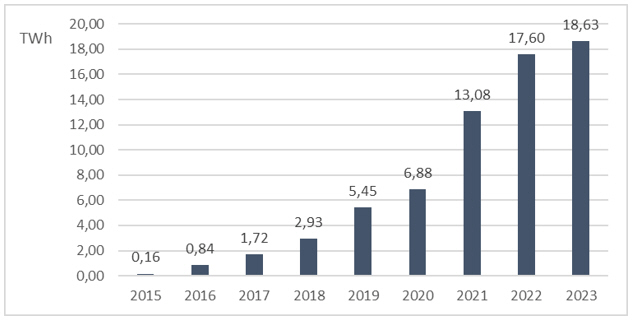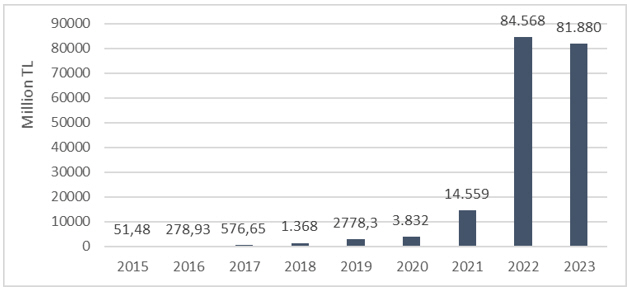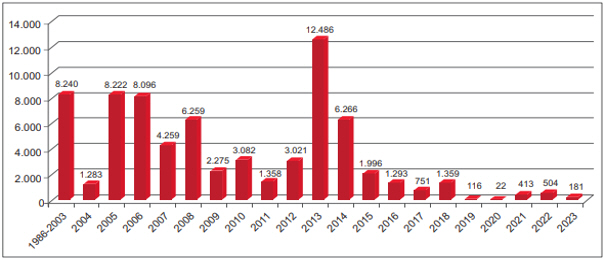Implementation of the Southeastern Anatolia Project (“GAP”) for development continues. GAP includes a wide array of investment products from agriculture to health, education, and transportation. Within the framework of 2021-2023 Regional Development Programme, an investment of TL 390,676,000 (approximately U.S. $11,896,345) was allocated to the region. Moreover, Konya Plain, Eastern Black Sea, and Eastern Anatolia development action plans were adopted and have been implemented by their respective development administrations.
In line with the objectives of the Paris Agreement, Türkiye declared its “net zero emissions target by 2053” as a part of its “green development revolution”. Moreover, Türkiye submitted its updated Nationally Determined Contribution (contribution to the Paris Agreement) to the UNFCCC Secretariat on 13 April 2023. Türkiye expects to reduce its greenhouse gas (GHG) emissions by 41% by 2030 (695 Mt CO2 eq in year 2030) compared to the Business-as-Usual (BAU) scenario, at the 27th Conference of the Parties (COP27) of the UN Framework Convention on Climate Change (UNFCCC) in Egypt. Türkiye is also updating the “Climate Change Action Plan, Long Term Strategy and Adaptation Strategy and Action Plan” within the context of its net zero target and green transition.
Amendments to Türkiye’s definition of “SME” were made via Small and Medium-Sized Enterprises Regulation published in the Official Gazette No. 32201 of May 25, 2023. Accordingly, Türkiye’s SME definition of enterprises has been harmonized with the EU.
Since 1991, Türkiye has been a member of the Financial Action Task Force (“FATF”), an inter-governmental global standard setting body responsible for developing and promoting policies to combat money laundering and terrorist financing (AML/CFT). To date, Türkiye has been evaluated by the FATF four times.
Between March 5, 2019 and March 21, 2019, an onsite visit was made to Türkiye by the assessment team comprised of other FATF member states’ experts and the FATF representatives in charge for the fourth round of FATF mutual evaluation. Subsequently, Türkiye’s Mutual Evaluation Report was adopted by the FATF Plenary in October 2019. The adopted report, which indicated that in regard to the results achieved in relation to the effectiveness (Immediate Outcome or IO), Türkiye has been placed in the observation period by the International Cooperation Review Group (one of the five working groups under FATF), was published on the FATF’s website in December 2019 and this observation period took 20 months.
In this process, Türkiye has remedied its deficiencies in 5 additional FATF recommendations in which the Republic has been re-rated as at least “largely compliant”. Türkiye is now rated as “largely compliant” or “compliant” with respect to 39 out of 40 FATF recommendations.
Despite all of the steps taken by the Republic, FATF Plenary has concluded that there is further room for improvement and has therefore placed Türkiye on the list of “Jurisdictions under Increased Monitoring”, also called the “Grey List” in October 2021.
At that time, FATF did not recommend that other jurisdictions take any action against Türkiye, which provided a high-level commitment to work with the FATF to strengthen the effectiveness of its AML/CFT regime. In this framework, together with Türkiye, FATF has provided an “action plan” in the issues of concern. Based on the decision taken by the FATF Plenary in February 2024, it was adopted that Türkiye completed all action items of the plan and the FATF decided to pay an onsite visit to Türkiye to see the enhancements on the ground.
In this regard, the Europe Eurasia Joint Group, which consist of experts from member countries, under the FATF’s International Cooperation Review Group (ICRG), conducted an onsite visit to Türkiye between May 2, 2024 and May 6, 2024. Following the onsite visit, an Onsite Visit Report was prepared and circulated to all FATF members. This report was also discussed in FATF/ICRG meetings during the FATF June 2024 Plenary and working group meetings. Consequently, the Plenary approved Türkiye’s exit from the “Grey List”.
Progress (Country) Reports
Since 1998, the European Commission annually publishes its regular Progress Reports on Türkiye, as well as the Enlargement Strategy Paper, which evaluate developments in all candidate and potential candidate countries.
The European Commission published the 2019 Enlargement Package, including Country Reports of all candidate and potential candidate countries on May 29, 2019. The 2019 Türkiye Report was in line with the previous year’s Report in almost all areas, from political to economic criteria as well as the acquis alignment. The European Commission welcomed that the state of emergency introduced on July 15, 2016 in the aftermath of the attempted coup ended on July 18, 2018. The EU also acknowledged the existence of threats Türkiye has faced since then. However, the Report criticized some measures which had to be taken by Türkiye in line with the European Conventions in the aftermath of the coup attempt. The Republic’s Ministry of Foreign Affairs underlines that the Report did not adequately highlight Türkiye’s efforts to continue with the political reform process and the steps taken in this context.
On the other hand, the 2019 Country Report on Türkiye noted that Türkiye is a key partner for the EU and a candidate country. The Report underlined that the EU and Türkiye continued their dialogue and cooperation in the areas of joint interest including a leaders meeting between Presidents Juncker and Tusk and President Erdoğan in Bulgaria in March 2018 and a High Level Political Dialogue in November 2018. Additionally, the Report stated that Türkiye and the EU further developed their cooperation in the areas of energy, transport, economy and trade, and further noted that a High Level Transport Dialogue in January 2019 and a High Level Economic
Dialogue was held in February 2019. The Report emphasized that the March 2016 EU-Türkiye Statement continued to deliver results, with both parties committed to its effective implementation. Furthermore, the Report underlined that Türkiye sustained its outstanding efforts to host more than 3.6 million registered Syrians under temporary protection and around 370,000 registered non-Syrians under international protection, which is the largest refugee community in the world.
With regard to economic criteria, the Report acknowledged that Türkiye was well-integrated with the EU market in terms of both trade and investment based on the fact that the EU was Türkiye’s largest trade partner while Türkiye ranks fifth in the EU’s external trade. The Report emphasized that Türkiye’s economy had sufficient capacity to cope with the competitive pressures and market forces within the EU. It also noted that certain improvements were achieved in the energy sector, along with an advancement in spending on research and development, education and physical capital.
With respect to acquis alignment, the Report confirmed that Türkiye has achieved a strong level of general alignment in 22 Chapters and yearly progress at various levels in 20 Chapters.
The European Commission published the 2020 Enlargement Package, including Country Reports of all candidate and potential candidate countries on October 6, 2020. The 2020 Country Report on Türkiye noted that Türkiye is a candidate country and remains a key partner for the EU.
The 2020 Türkiye Report summarized European Council decisions and referred to the positive agenda and potential areas of cooperation between Türkiye and the EU with a specific emphasis on the modernization of the Customs Union and trade facilitation, people to people contacts, high-level dialogues, continued cooperation on migration issues, in line with the 2016 EU-Türkiye Statement.
51

